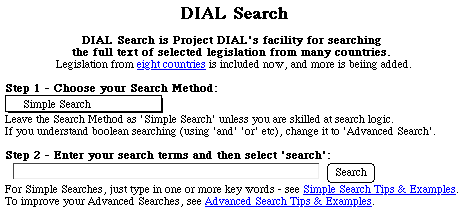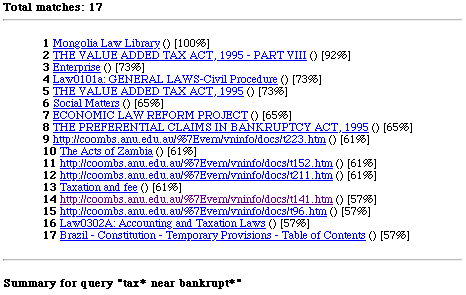[Previous]
[Next]
[Up]
[Title]
7. Searching the full text of laws world-wide - DIAL Search
The DIAL Search component of Project DIAL uses the SINO search engine to search
over all of the world-wide legislation which is able to be indexed by the
targeted web spider. From the DIAL Search interface shown below, searches may
be entered using boolean and proximity operators and truncation.
 The
DIAL Search interface, with `Boolean (Ranked Results)' selected
The
DIAL Search interface, with `Boolean (Ranked Results)' selected
Two types of search/display options are provided:
* Advanced Search - This is the most powerful form of searching,
where searches can be made using boolean and proximity connectors, and the
results are then also ranked in likely order of relevance. This allows
reasonably broad searches (to aid completeness) with the relevance ranking then
providing more precision. This display option is illustrated below. (This is
AustLII's Boolean (Ranked Results) search method.)
* Simple Search - Users can enter text in any form (eg `I want laws
on tax and bankruptcy' or `tax taxation bankrupt bankruptcy') without knowing
about search connectors, truncation etc. Results are ranked according to likely
relevance. The user will obtain a useful list of search results, although often
not as complete as a boolean search can provide. This is the search method
recommended for inexperienced users, and is the default option. (This is
AustLII's Freeform (Ranked Results) search method.)
At a later stage of development, when we are able to provide useful database
and library headings within DIAL Search, more display options will be provided
which allow search results to be displayed grouped by database of origin rather
than by relevance ranking (as is currently available on AustLII).
Results are displayed as shown below. In this example, legislation is found
from Mongolia, Zambia (the Value Added Tax Act and Preferential
Claims in Bankruptcy Act items), and Vietnam (the `Enterprise', `Social
Matters' and `Taxation and Fee' legislation tables of contents, and those items
beginning `http://coombs'), and the items ranked in likely order of relevance

Further work on the display of results may result in the name of the database
from which each entry comes being displayed with it, so it is easier to
recognise which counties particular legislative items are from.
Searches over DIAL Search such as the one above are included as `stored search
links' in the DIAL Index. In the Telecommunications subject page example above,
the link `Search full text of legislation for telecommunications - (DIAL
Search)' is a stored search for `telecommunications' with a relevance ranked
display. On the Intellectual Property subject page there is a stored search for
`intellectual property or unfair competition or copyright or patent or trade
mark or trade secret. These are relatively simple searches, but much more
complex searches using the full range of search connectors can be stored.
The significance of these `stored searches' of DIAL Search in the DIAL Index is
twofold:
- Those responsible for developing and maintaining the DIAL Index have
expertise in search techniques, and know what types of searches are most
effective over DIAL Search. By creating stored searches at sensible locations
in the index they make this expertise available to users of the index who are
unlikely to have the same level of search expertise.
- An expert who creates a stored search only has to do so once. When more
data is added to the DIAL Search database, the expert does not have to change
the stored search, because it will now find relevant new legislation as well as
the old legislation (assuming the search was well-constructed in the first
place). In contrast, sets of ordinary hypertext links to legislation do have
to be updated when legislation changes. This method creates to some extent a
`self-maintaining index' of the material in DIAL Search.
[Previous]
[Next]
[Up]
[Title]


